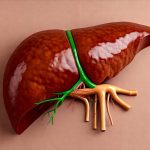The liver is often called the workhorse of the body, silently performing hundreds of essential functions every minute. From processing nutrients and detoxifying harmful substances to regulating blood sugar and producing vital proteins, its role is fundamental to overall health. We rarely think about our livers unless something goes wrong, but because many early signs of liver congestion are subtle and easily dismissed as general fatigue or digestive issues, problems can often go unnoticed until they become more serious. Understanding what constitutes liver congestion – a state where the liver isn’t functioning at its optimal capacity due to overload – and recognizing potential indicators in daily life is crucial for proactive health management.
Liver congestion isn’t necessarily the same as liver disease, but it significantly increases the risk of developing it over time. It represents a functional impairment, an overburdening of the organ that can stem from various factors like poor diet, excessive alcohol consumption, exposure to toxins, chronic stress, or even certain medications. Recognizing these early warning signals allows for lifestyle adjustments and supportive care strategies that might prevent more significant health complications down the road. This article will explore some common signs of liver congestion you may be experiencing and how to address them through mindful living.
Understanding Liver Congestion & Its Common Causes
Liver congestion, in its simplest form, means the liver is struggling to keep up with its many tasks. Imagine a busy highway during rush hour; when too many cars try to use it simultaneously, traffic slows down and eventually grinds to a halt. Similarly, when the liver is overwhelmed by toxins, fats, or metabolic waste products, its efficiency decreases, leading to congestion. This isn’t always dramatic or painful, but it manifests as a collection of subtle symptoms that can easily be mistaken for other conditions. It’s important to remember this is often a gradual process; signs accumulate over time rather than appearing suddenly.
Several factors contribute to liver congestion. A diet high in processed foods, sugar, and unhealthy fats forces the liver to work harder processing these substances. Excessive alcohol consumption directly damages liver cells and impairs function. Exposure to environmental toxins – found in cleaning products, pesticides, and even some cosmetics – adds to the burden. Chronic stress elevates cortisol levels, which can negatively impact liver health. Even seemingly innocuous things like sedentary lifestyles and chronic dehydration can play a role by hindering natural detoxification processes. It’s rarely one single cause but rather a combination of these lifestyle factors that leads to congestion.
Addressing liver congestion isn’t about aggressive intervention; it’s about easing the burden on this vital organ. This involves making conscious choices to reduce exposure to toxins, improve dietary habits, manage stress levels effectively, and support the liver’s natural cleansing mechanisms. Think of it as providing your liver with the resources and space it needs to function optimally.
Recognizing Physical Signs of Congestion
One of the most common physical signs is fatigue, often described as a persistent tiredness that doesn’t improve with rest. This isn’t simply feeling tired after a long day; it’s an overwhelming exhaustion that can interfere with daily activities. Another frequent indicator is digestive discomfort, including bloating, gas, and indigestion – particularly after meals high in fat. The liver plays a critical role in bile production, which aids in the digestion of fats. When congested, bile flow may be impaired, leading to these symptoms.
- Skin issues are another potential sign. Liver congestion can manifest as skin rashes, eczema, or even unexplained itching. This is because the liver’s inability to efficiently clear toxins can lead to their accumulation in the skin.
- Changes in stool color can also be a clue. Pale, clay-colored stools might indicate insufficient bile production and should prompt further investigation.
- A feeling of fullness after eating only small amounts of food is another sign, suggesting impaired digestion due to reduced bile flow.
It’s crucial to note that these symptoms are non-specific and can be associated with various conditions. However, if you experience a cluster of these signs consistently, it warrants further attention and consideration of potential liver congestion. Don’t self-diagnose; instead, use this information as a starting point for open communication with your healthcare provider.
Emotional & Mental Connections
The connection between physical and mental health is undeniable, and the liver’s function directly impacts emotional well-being. Liver congestion can contribute to mood swings, irritability, and even feelings of anger or frustration. This is because the liver helps regulate hormones and neurotransmitters, which play a crucial role in mood regulation. An overburdened liver may struggle to maintain hormonal balance, leading to emotional instability.
Beyond irritability, some individuals experience difficulty making decisions or feeling overwhelmed by tasks that once seemed manageable. Brain fog – a sense of mental cloudiness and reduced cognitive function – is also common. The liver’s detoxification processes are essential for maintaining optimal brain health; when congested, toxins can accumulate in the brain, impairing cognitive function.
- Chronic frustration or unexplained anger often point to imbalances within the liver meridian in traditional Chinese medicine.
- Difficulty letting go of negative emotions and holding onto resentment may also be linked to stagnant liver energy.
- Recognizing these emotional signs is important because they are often overlooked but can provide valuable insight into underlying liver health.
Lifestyle Adjustments for Liver Support
Supporting your liver doesn’t require drastic changes; small, consistent adjustments to your lifestyle can make a significant difference. Dietary modifications are paramount. Reduce your intake of processed foods, sugar, and unhealthy fats. Incorporate more liver-friendly foods like cruciferous vegetables (broccoli, cauliflower, cabbage), leafy greens, beets, garlic, and turmeric into your diet. These foods contain nutrients that support liver detoxification and regeneration.
Hydration is also crucial. Drinking adequate water helps flush toxins from the body and supports optimal liver function. Aim for at least eight glasses of water per day. Regular exercise promotes circulation and reduces stress, both of which benefit liver health. Even a 30-minute walk each day can be beneficial.
- Minimize exposure to environmental toxins by choosing natural cleaning products and avoiding pesticides whenever possible.
- Manage stress through techniques like yoga, meditation, or deep breathing exercises.
- Consider incorporating supportive herbs and supplements under the guidance of a healthcare professional (e.g., milk thistle, dandelion root).
Disclaimer: This article provides general information about potential signs of liver congestion and lifestyle adjustments for support. It is not intended to be a substitute for professional medical advice, diagnosis, or treatment. Always consult with your healthcare provider before making any changes to your diet, exercise routine, or supplement regimen. If you are experiencing concerning symptoms, seek immediate medical attention.


















